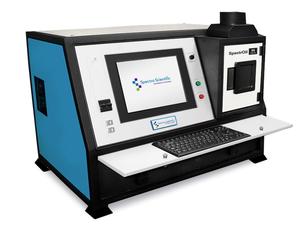
The SpectrOil M/F-W has become the standard instrument when on-site and immediate fuel analysis is a necessity. It fulfills the requirements of ASTM D 6728, Standard Test Method for Determination of Contaminants in Gas Turbine and Diesel Engine Fuel by Rotating Disc Electrode Atomic Emission Spectrometry.
Features and Benefits
- Conforms to ASTM D6728 – “Standard Test Method for Determination of Contaminants in Gas Turbine and Diesel Engine Fuel by Rotating Disc Electrode Atomic Emission Spectrometry”
- No sample preparation
- 30 second analysis time
- Bench-top and transportable
- Analyzes all elements simultaneously
- Always ready to analyze samples
- Simple to operate without special training or background
- Standard and readily available consumables
- Requires no special utilities or gases, only AC power
- Optional turbine cleaning water and injector analysis program
The SpectrOil M/F-W is a compact, rugged and easy to use fuel analysis spectrometer. It is designed specifically for the analysis of ash-forming contaminants in fuel such as sodium, potassium and vanadium that cause corrosion or deposits at turbine operating temperatures. It measures trace quantities of dissolved or suspended contaminant particles in a fuel sample using the time-tested and reliable rotating disc electrode (RDE) technique.
Pre-conditioning of the fuel before it reaches the gas turbine is a prerequisite for installations using heavy petroleum fuel. Spectrometric analysis with the SpectrOil M/F-W determines the amount of treatment required and the efficiency of that treatment. In particular, sodium and potassium must be accurately measured to less than one part-per-million, and vanadium concentrations must be determined to calculate the amount of magnesium treatment compounds to be added to the fuel. Analysis requirements start with the delivery of the fuel, continue through fuel handling, and end only as the fuel is injected into the turbine.
The SpectrOil M/F-W is calibrated for accurate analysis without sample preparation of contaminants and additives in fuels, regardless of their origin or characteristics. The fuels it analyzes can vary from No. 2 distillates to No. 6 residual fuels as well as crude oil. Even highly volatile fuels, such as naphtha or gasoline, can be analyzed after sample preparation.